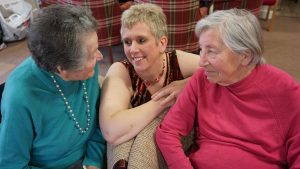 I learnt again today, how our best role as Christians is to be like the Easter donkey.
I learnt again today, how our best role as Christians is to be like the Easter donkey.
This is a true story, but the names are changed for anonymity’s sake. For some months now I’ve been visiting an elderly relative – let’s call her Mary – in a local nursing home. She’s always been sitting in a big lounge in a semi- circle of eight other ladies who have often been included in our conversation. A couple of weeks ago on Mothering Sunday a friend, Frances, and I went together. We exchanged greetings and said how we’d been given flowers during our church service and what a lovely service it had been. One of the ladies said she was Roman Catholic and asked how we described ourselves as Christians. We explained that we didn’t have a label like that: we didn’t call ourselves Baptist, or Anglicans, or Presbyterian or anything, but we loved the Lord Jesus Christ and went to churches that worshipped Him and taught the Bible.
Margaret, a 94 year old who had been independent until she suffered a stroke about a year ago said she loved the psalm about ‘The Lord is my shepherd,’ but couldn’t remember all of it now. She tried to say it every night before she went to sleep, but couldn’t get to the end of it. ‘I’ve got it on my Kindle on my phone,’ I said, ‘Shall I read it now?’ So I did – you could have heard a pin drop. ‘Shall I read my favourite psalm?’ I asked. ‘Oh yes, please!’ I read psalm 139. My eyes were on the words so I couldn’t see their faces, but Frances said they were ‘all aglow’. Then we said the Lord’s prayer together, and then, because Frances has an excellent voice we all sang a few verses of the old, familiar hymns. To end our impromptu ‘service’ I prayed for them individually, by name, for freedom from pain, for a good night’s sleep, and that most of all they would sense the presence of the Lord Jesus with them. A couple had tears in their eyes and one said, ‘Praying brings things together…’
Earlier this week my relative was ‘promoted to Glory’, as the Hospital Chaplain put it, and I thought I’d visit the Nursing Home today to thank them for their kindness to her. I’d hardly said ‘hello’ when Margaret grasped my hand and said how sorry they were for my loss and that they’d all said the Lord’s prayer together when they’d heard the news. I said not to be sorry and I wasn’t sad because Mary had put up with an awful illness for a long time and had longed to be at Home with the Lord. ‘Yes,’ said Margaret, ‘She would sit there muttering to herself but she was praying, really.’ Then she said, ‘Will you still come and visit us? Will you read to us?’ and Ethel, sitting next to her nodded vigorously. So, I will. And I thought again how these are the Sunday school generation, and marvelled at the connection the Holy Spirit makes, again and again. As one of the modern songs says, ‘He never gives up, never lets go!’
Psalm 42:7 says that ‘deep calls to deep …‘ Watchman Nee and others agree that it is about ‘the deep things of God calling to the deep things of man.’ And many people have described examples of experiencing this, and seeing it happen even with people with deep dementia. And why not people with dementia? Because the Spirit bypasses the damaged brain and touches the spirit of the person. I think it’s one of the most precious things Jesus does.
So I’m puzzled by a passage in a book I’ve been sent for review that refers to Carl Rogers, a psychologist who shifted counselling from the Freudian, expert-lead premise to Person Centred counselling. His values were avowedly humanistic. The author notes that he wrote, ‘When I am closest to my inner, intuitive self, when I am somehow in touch with the unknown in me …Then, simply my presence is releasing and helpful to the other … Our relationship transcends itself and becomes part of something larger. Profound growth and healing are also present.’
The author suggests that this ‘deep calling to deep’ is what happens when this person to person connection is made,’ simply by one being fully with the other in silence and stillness, drawing them both into what the Bible describes as ‘the breadth and length and height and depth’, and the knowledge of ‘the love of Christ that surpasses knowledge’ (Ephesians 3:18-19). It is a kind of wordless prayer.
Perhaps it’s the juxtaposition of Rogers the humanist, with the love of Christ that perplexes me. I’ve seen the Holy Spirit at work so many times – as with the ladies in the nursing home, that I believe that it’s nothing to do with ‘finding the unknown in myself’ and a transcending relationship. The work; the power and the glory are His, all His. It’s very relaxing to know that. If you’d like to bless frail residents in care homes you can be happy knowing that, like the Easter donkey, you’re simply carrying Someone too marvellous for words.














